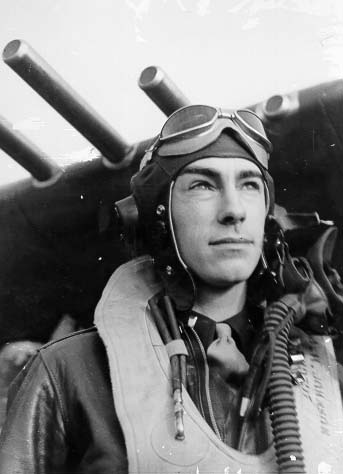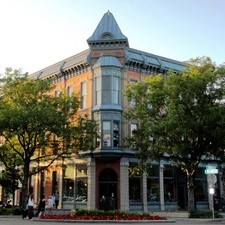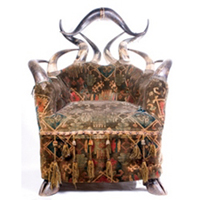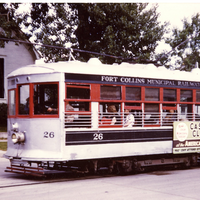Bailing Out Over Enemy Territory, Working for the French Resistance, and Getting to be a 'War Hero'
Bailing Out Over Enemy Territory, Working for the French Resistance, and Getting to be a 'War Hero'
Courtlyn Hotchkiss
March 1, l995
Interviewer: Fort Collins Historical Society Program
"The only reason that I'm a so-called hero - somebody put that in the paper-is because I was shot down," Hotchkiss began his speech. " If I had been doing my job right, I would have finished my tour, come home, and nobody would have heard of Court Hotchkiss. It's a matter of where you are, what time, what happens to you, and whether you live through it."
Hotchkiss considers himself lucky to have gone to school at CSU, although he was "a bad ROTC student" because he couldn't ride the horses. Instead of horses and the artillery, he entered the "Civilian Pilot Training Program." This meant flying lessons paid for by the government, which seemed like a great idea, except for the obligation to serve in case of war. After Pearl Harbor, Hotchkiss "didn't have a choice. I went right down and volunteered. They were looking for pilots . . and before I knew it, I was a second lieutenant."
Hotchkiss was with one of the first fighter outfits in Europe. They were flying high altitude escorts for B-17s and B-24s. He was on the Schweinfort raid when America lost 61 bombers, each with ten people in them. He described the Wilhemstraven, Germany raid as terrible and also recalled the first Berlin raids. He speculated whether these raids were effective in slowing down the German war industry, but believes it did demoralize the German people. "We flew what is described in the history text books as the air offensive of '43-44. We put over a thousand bombers in the air everyday. We had 600-700 fighters trying to escort them. It was an interesting period.
I became 'famous' by volunteering - and when you're 23 you're stupid enough to volunteer - to lead a little light plane strafing mission down into France." Hotchkiss was flying an airplane named for the woman who would later become his wife, strafing at low altitude, when he heard his wing man call, "Lockyear Red Leader, you're on fire!"
"I didn't even know I'd been shot. I looked in the rear view mirror. You're damn right. I was on fire. There was black smoke coming out all over everything behind me. I pulled up as high as I could, which is maybe 1000 feet, put the canopy open, and tried to bail out. Bailing out of a fighter plane is not something I had practiced. . . You just do the best you can. It was a very difficult job because it's cramped quarters. You've got a . . . rubber boat under you. You've got a parachute. You've got oxygen masks. You've got radios. Everything has to be disconnected. I thought this is not going to be too difficult, so I tried to jump out. Anyone who knows anything about aerodynamics, knows the minute you get up into that 150 miles per hour wind, you're just plastered against the back of the canopy. You can't move. After you let go of the controls and your feet are off the rudders and everything, you're sitting up there sort of half in and half out of the airplane. I had to crawl back down in and then crawl out. Once you get out halfway, the wind then helps you. It tears you right out of there. Then you worry about being decapitated by the tail. I can remember the tail going by very close. I bailed out with no practice whatsoever. I did it perfectly. I pulled the rip cord and it opened and I landed on the ground. . . There I was in France, in northern France, March 17th. That's 90 days before D-Day."
Hotchkiss reminded his audience that nobody was sure there was going to be a D-Day or whether the hoped-for allied invasion of Europe would be successful. A lot of pilots were stranded in France, having been shot down behind enemy lines. If you became a German prisoner of war, the Red Cross would notify your family you'd been captured; but Hotchkiss, hiding in the woods, resolved to try to evade capture and to attempt the walk to Spain. He walked for almost three days, making about 20 miles, then calculated he had some 700 to go and needed to try another tactic. He stood at the edge of the woods one evening and watched a French farmer plowing with an ox, then stepped out before him and made "nice gestures."
"I was very fortunate because there was a $10,000 reward for turning in American flyers, which he could have gotten." But the farmer did not turn him in and Hotchkiss used his high school French to establish communication. The farmer came back after dark and took him to the underground. "Within four or five days, I was an active member of the Resistance. With that I had joined a boys' club that were terrorists. They blew up bridges, killed Germans - all those nice things that as a coward I didn't want to do. . . Hotchkiss got the assignment of traveling the country on a motorcycle to interrogate those claiming to be shot-down pilots to see if they were truly American and not Germans trying to infiltrate the Resistance. He asked a few questions like "Who Won the World Series?" and "Who Was Babe Ruth?" Some didn't check out. He ensured his own safety by not staying too long in any one village. He wore civilian clothes, which meant he could have been shot as a spy if detected by the Germans.
Hotchkiss had been given a new identity by the French. He was Claude Marchand, an engineer, born in Corsica. He used his high school French to speak to any Germans he encountered They, fortunately, were also speaking French from textbooks. He recalls one close call when he was on a bus trip with members of the French Underground who were seated on a crowded bus while he stood. When the bus stopped at a small town and a German Major left the bus, Hotchkiss, thinking this was his chance for a seat, took the officer's seat just as he returned from going to the bathroom. Hotchkiss took a chewing out, eyes down, all the while hoping the officer would not notice his shoes which, although somewhat disguised, were still obviously GI issue.
He described the women of the Underground as being very tough and especially effective as escorts. "An American riding along on a bicycle is one thing-you take a couple, holding hands, riding down the road, you were not a suspect. The woman could be bitchy in fluent French if the Germans stopped them and you could keep your mouth shut. They used the women a great deal. They did a lot of leadership roles, a lot of the pretty dirty work."
During his time in France, he was in contact with British Intelligence, which had agents all over France. He remembers being with a group of Americans hiding in the woods one day when a British intelligence agent reminded them they were still American soldiers and were required to follow orders and fight when the invasion came, even though pilots were not trained in ground combat.
When D-Day came, it was difficult to get news. Radios had to be hidden and no one dared to display maps. The build up at Normandy took a long time and the French and the downed pilots were impatient to be liberated. Hotchkiss persuaded another pilot to steal bicycles and go to Paris, thinking that Paris would not be bombed and would be a free city.
It took three days to ride into "the biggest damn mess you could ever see." They arrived as the Battle of Paris started. Although he wanted to "just hide some place," as Americans they were expected to fight and they did. Hotchkiss was at the Arch de Triomphe when de Gaulle came in to make his grand entrance. He was also near the Neubrigue runway which was badly shot up and found a Lt. Colonel "absolutely shell shocked." Hotchkiss told the man he was an American pilot and offered his help in getting medical assistance. In gratitude for his help the Colonel arranged transportation to Omaha Beach for Hotchkiss. From there he was able to get to London where he was debriefed by the British for three days. He was given new uniforms and was told his parents would be notified, but he must "keep silent." Although British Intelligence had known he was alive within 48 hours after he was shot down, somehow the word had never reached American authorities. His fiance and parents had received messages that he was missing in action and later, "killed in action." He soon found a cablegram office and sent his parents the message still treasured by the family today, "I'm safe and well. I'm back in England. Home soon." It would be another three weeks before his family would be officially notified of his safety.
Hotchkiss received the Purple Heart, the Air Medal, Three Oak Leaf Clusters, and the Distinguished Flying Cross. He returned to Fort Collins where he had a long association with CSU, serving in several different posts. He was elected to county commissioner in 1979 and served 16 years. A lodge at Pingree Park is named for him.


Preserving the history of Fort Collins, Colorado & the Cache la Poudre region






